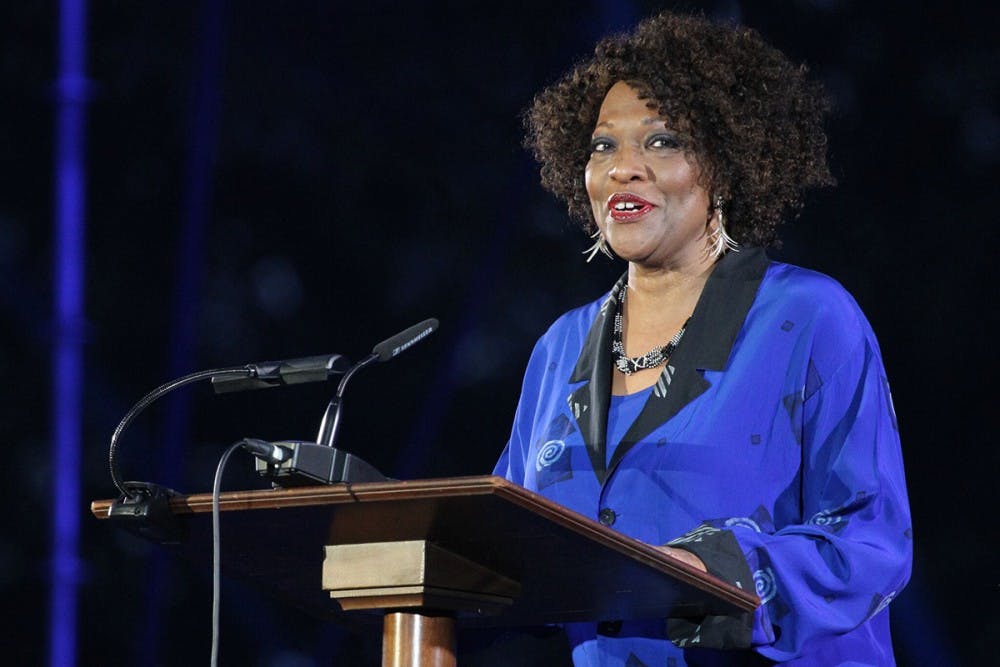The University Creative Writing Program held a public talk with English Professor and former U.S. Poet Laureate Rita Dove Tuesday night at the Paramount Theater, contemplating poetry and its contemporary significance after the violent white nationalist events of Aug. 11 and 12.
The event was originally supposed to be a conversation between Dove and Mark Doty, the University’s Kapnick distinguished writer-in-residence and a recipient of the National Book Award. However, Doty was unable to attend due to a medical emergency.
Although the event was first planned to be held on Grounds, the location was changed to downtown Charlottesville.
“Once we realized how hungry the community at large [was], everyone needed to have this conversation,” Dove said in an interview with The Cavalier Daily. “Then we thought the only thing to do was to try and move it off Grounds to the places where fear and intimidation were in the streets.”
Jane Alison, an English professor and director of the Creative Writing Program, said holding the event at the Paramount Theater was made possible by the Provost’s Flash Funding initiative, which provides support for programs addressing racial tension in the community.
“In other times of public violence, wars, lynchings, events like 9/11, many of us have turned to poetry,” English Prof. Jahan Ramazani said when introducing Dove. “Poetry can bring us into the experience of such violence but also provide us with a wider frame to understand.”
Dove laid out the framework for the event — she would share and discuss poems she and Doty found easy, difficult and impossible to write.
Because of Doty’s absence, Dove read aloud his poem, “In Two Seconds,” about the 2014 police shooting of Tamir Rice in Cleveland, Ohio.
“There is a point in the poem where it needed to come out more than caring what anyone thought about it,” Dove said. “I think one of the things that keeps us separate is fear that we have of what other people will think if we voice an opinion.”
For Dove, the poem she wrote with ease was “Trayvon, Redux.” It was told from the perspective of George Zimmerman, who killed Trayvon Martin in 2012 in Sanford, Fla. She wrote the poem in just a few hours, but said she had been thinking about it for a year and a half.
“What I couldn’t do, and I knew it even at that moment — I could not forgive,” she said. “I could not get into that space that would have allowed me to give him any moment of compassion.”
By contrast, the poem she found difficult to write described forgiveness in the aftermath of violence. This poem, “Transit,” was inspired by Holocaust survivor Alice Herz-Sommer.
Dove then shared an email from Doty describing the poem he could never finish. He attempted to write about Sandra Bland, who committed suicide in a Waller County, Texas jail in 2015 after being arrested at a traffic stop. Bland’s family reached a settlement in a wrongful death lawsuit against Waller County and the Texas Department of Public Safety for $1.9 million in 2016.
“I wanted to focus on the particular atrocity of the officer’s language,” he wrote in the email statement. “I don’t know how much these words mattered to Sandra Bland, but I am a poet, and they matter a great deal.”
Dove shared snippets of unfinished poetry, which also explored the inadequacy of language to describe the current political environment.
“One of the things that is difficult for all of us, poet or not, is to reclaim the language that has been kind of brutalized in all the brutal things that have happened,” she said. “Although the events of this summer have left us all shattered, what I find even more frightening than the events is the numbing effect it has had on us.”
Alison and Dove both told The Cavalier Daily that as University professors, they saw that issues of identity and violence have become increasingly part of the conversation around poetic expression for creative writing students.
Dove expressed hope that the conversation around poetry, divisions and violence would continue.
“And if we’re going to be talking about divisions, then one of the chief divisions of this town is between town and gown,” she said. “We really have to break that one down too.”







